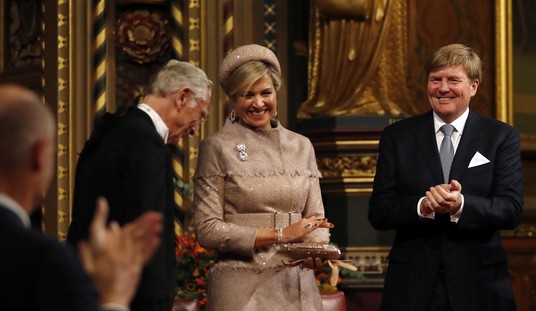Philip Bump had a story up at the Post yesterday titled “The sliding definition of ‘lockdown’ in U.S. politics.” I missed it yesterday but today I caught Pradheep Shanker’s reference to it on Twitter. Pradheep called it “fundamentally dishonest” and he’s absolutely right about that. In fact, the headline for the piece works pretty well as a description for the effort Bump himself is making to redefine “lockdown” more than it does as an analysis of recent history. Here’s Bump’s description of the early days of the pandemic in the US:
When the novel coronavirus appeared in the United States in early 2020, experts — both medical and political — had little information about how best to handle it. It seemed, based on preliminary and ultimately inaccurate information, to spread through contact, meaning that the focus became hand-washing and Clorox wipes instead of covering one’s mouth. There was, however, full understanding of that lack of certainty, meaning that authorities tended to err on the side of caution to keep the virus as contained as possible and limit its damage.
What followed the virus’s arrival, then, was an ad hoc effort to restrict person-to-person interactions as much as possible. Bans on large gatherings were implemented and recommendations were made to remain at home as much as possible, with compliance voluntary. The hard-and-fast prohibitions centered on places where people might tend to congregate, such as bars and schools. It was a restriction of options more than a restriction of activity.
Notice there’s one word he’s avoiding to describe that restriction of activity. He won’t call it a lockdown. And in the next paragraph he explains why:
This was appreciably different from what had already been underway in China. There, movement was at times restricted entirely as the autocratic government sought to stamp out transmission of the virus in one fell swoop. First the city of Wuhan, where the virus was first detected, then other cities as cases emerged. These were “lockdowns” in an often literal sense: people forced to stay in place in an effort to halt the virus. When looser rules arrived in the United States months later, the same term was often applied by Americans to a very different process.
The effects of that have lingered. Over the past three years, the idea that the United States had a system of “lockdowns” has persisted, and an array of responses to the virus has been loosely grouped under that umbrella: remote schooling, restaurant closings, restrictions on entering facilities.
I’m not using this word casually but this is gaslighting. It’s moving the goalposts to the point that one might indeed begin questioning their own sanity. Bump is retroactively claiming that the US never really had any lockdowns, only China had actual lockdowns, i.e. people being welded into their apartment buildings for weeks at a time.
Here’s the problem with that argument. Everyone in the US called what we did here in 2020 and beyond “lockdowns.” This wasn’t a partisan thing at the time, it was universal. Indeed, it was major media outlets like the Washington Post that helped spread this shorthand for various COVID restrictions. I could probably come up with a list of 1,000 major media stories from 2020 using this term given a little time but let’s just consider a handful from Bump’s own newspaper.
- March 21, 2020: Much of Europe is now on lockdown. But can authorities actually enforce those rules? – “For many in France, Friday is market day. And in many outdoor markets across the country, this particular Friday was no exception, even though it was three days into a government-enforced lockdown designed to halt the spread of coronavirus.”
- March 22, 2020: Inside California’s great lockdown, glimpse America’s stay-at-home future – “On Monday, San Francisco and five other Bay Area counties were among the first in the nation to officially order residents to stay home to slow the spread of the novel coronavirus. By penalty of law, going outside is allowed only for certain jobs, food shopping and other “essential” activity.”
- March 25, 2020: In lockdown with your partner? Here’s how healthy couples survive. – “Life has been no party lately. Coronavirus has shattered our routines, pitched our economy into free fall and left us stunned. We’ve been stripped of our social safety nets, those customary conversations with neighbors, friends and family. We’re isolated and split off from each other like fish from water.”
- April 9, 2020: The silver lining to coronavirus lockdowns: Air quality is improving – “given that all but a handful of states have implemented stay-at-home orders, the air-quality shifts are also being seen in the United States.”
- April 29, 2020: Why you might be dreading the end of lockdown – “Healey thinks that the gradual return to pre-lockdown life — with phased-in reopenings and a slow easing of social restrictions — will probably be helpful for all of us”
- May 6, 2020: Top officials around the world keep getting caught breaking lockdown rules – “epidemiologist Neil Ferguson, a key adviser to the British government on its coronavirus response, resigned after the Telegraph reported that he broke lockdown protocol when a woman the newspaper described as his lover visited him at home. Ferguson and his colleagues at Imperial College London were behind a key study this year that forecast the novel coronavirus could kill huge numbers of people in the United States and United Kingdom — research that helped influence government decisions to adopt strict lockdown measures.”
- October 22, 2020: Why countries are resorting to pandemic lockdowns again – “As the economic turmoil of the spring and summer continues, lockdown is a dirty word for many governments. Officials in Sweden and Belgium emphasized that new restrictions, reported as lockdowns in the media, were recommendations, not rules.”
- December 16, 2020: A top scientist questioned virus lockdowns on Fox News. The backlash was fierce. – ” Jeffrey Flier, former dean of Harvard Medical School, supports social distancing and favored the spring’s lockdowns. He is harshly critical of Trump, but also troubled by what the Ioannidis episode showed about scientists’ intolerance for facts that might be seen as buttressing the Trump administration’s policies.”
Again, those are all from the Washington Post and all from 2020. Here’s one more titled “Crime fell in a locked-down New York City — but less than you might think.” That one was published April 15, 2020 and was written by Philip Bump: [emphasis added]
Data reported by the New York Police Department through its CompStat system show that the number of major crimes committed in the city over the past 28 days are down by about 30 percent relative to the same period in 2019. That includes a few days before the lockdown, which was announced on March 20. In recent days, the drop relative to a year ago has been about a third.
To be fair, there were some voices pointing out that what the US was doing wasn’t the kind of “lockdown” that was happening in China. Here’s Leana S. Wen pointing out the difference in November 2020:
I understand that a “shutdown” or “lockdown” is a convenient shorthand to describe restrictions that states have recently put into place. This week, Washington state closed bars and restaurants for indoor dining and prohibited indoor social gatherings for people in different households. Michigan closed casinos and movie theaters and ended in-person classes for colleges and high schools. And as of Thursday, New York City’s public schools are returning to all-remote instruction.
But let’s get our terminology right: These restrictions are not lockdowns. A lockdown is what the Chinese government imposed in February, forcing people to remain in their homes and preventing 780 million people from traveling city to city. A broader definition of lockdown could also include the stay-at-home orders most states instituted in March. (Though it’s important to note that eight states never issued these orders, so the United States never had a national lockdown.)
It’s true we never had a national lockdown but that’s probably because in the US a lot of public health decisions happen at the state level. But as you can see from the very partial list of articles above, the distinctions between US lockdowns and Chinese lockdowns were not generally made by the Washington Post or other news outlets reporting on the situation at the time. In fact, they nearly always referred to stay at home orders, school closures, bar closures, etc. as lockdowns.
It would be one thing to argue that the media was wrong to do this all along, but Bump’s piece yesterday wasn’t an admission of failure, either personally or collectively by the media. Instead he’s just retconning history so he can claim the use of the word now is a rhetorical ploy by crafty Republicans:
It’s certainly true that Republican officials (and Republicans) have consistently been less fervent about coronavirus responses than Democratic officials (and Democrats). The partisanship of the pandemic is broad and well-documented. But the idea that Democrats enacted “lockdowns” or seek new “lockdowns” persists not because there have been calls even to introduce new limits on in-person interaction. Rather, it endures because it is politically useful to suggest that Democrats want to do so — since using “lockdown” as a synonym for “government forcing you to do something” plays into long-standing Republican rhetoric.
Sorry, no, that’s not what happened. What did happen is that nearly everyone in the media including Philip Bump used the term “lockdowns” in a colloquial manner to describe what states and counties and mayors were implementing in the US.
Bump’s problem is that over time the term lockdown has become a lot less popular, and for good reason. Now that people can see the terrible impact that school lockdowns had on children, those decisions, often made by progressive politicians and supported by progressive unions, don’t look so good in retrospect. It turns out that reopening schools early as Georgia and Florida did was better than letting union cranks set policy as Chicago and parts of California did. The Associated Press reported on the regional differences in school reopening last year:
There were stark differences based on where students live, reflecting the regional battles that have played out as cities debate how to reopen schools.
In the South and Midwest, where schools were the quickest to reopen, just under 40% of eighth grade students were enrolled full time in classroom instruction in January. In the West and Northeast, the figure was about 10%.
It would be convenient for progressives if they could claim we never really had any lockdowns and that Republicans claiming otherwise are being dishonest. Unfortunately, all anyone has to do is Google the word “lockdown” at any major news outlet and you’ll see this wasn’t part of a GOP conspiracy. On the contrary, Philip Bump has more to do with this than your average GOP voter.








Join the conversation as a VIP Member